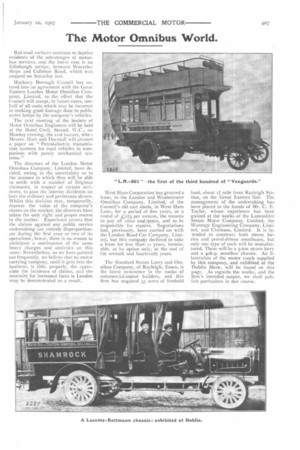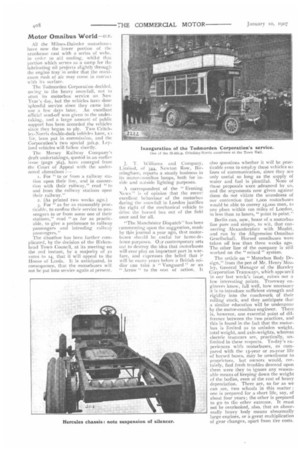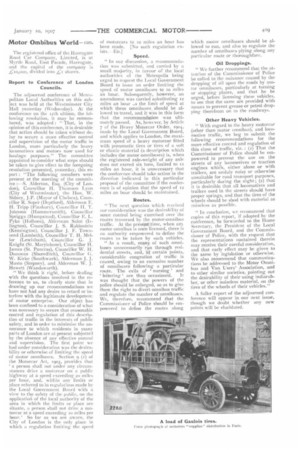The Motor Omnibus World.
Page 7

Page 8

Page 9

If you've noticed an error in this article please click here to report it so we can fix it.
Bad road surfaces continue to deprive residents of the advantages of motorbus services, and the latest case is an Edinburgh service, between Waverley Steps and Canton Road, which was stopped on Saturday last.
Hackney Borough Council has entered into an agreement with the Great Eastern London Motor Omnibus Company, Limited, to the effect that the Council will accept, in future cases, onehalf of all costs which may be incurred in making good damage done to public street lamps by the company's vehicles.
The next meeting of the Society of Motor Omnibus Engineers will be held at the Hotel Cecil, Strand. W.C., on Monday evening, the 21st instant, whel Messrs. Hart and Durtna11 will present a paper on " Petrol-electric transmission systems for road vehicles in comparison with purely mechanical systems."
The directors of the London Motor Omnibus Company, Limited, have decided, owing to the uncertainty as to the manner in which they will be able to settle with a number of litigious claimants, in respect of certain accidents, to pass the interim dividends on both the ordinary and preference shares. 'Whilst this decision may. temporarily, depress the value of the company's shares on the market, the directors have taken the only right and proper course in the matter. Experience proves that the claims against any public service undertaking are entirely disproportionate during the first year or two of its operations ; hence, there is no reason to anticipate a continuance of the same heavy charges and anxieties on this score. Nevertheless, as we have pointed out frequently, we believe that no motor carrying company, until it gets into the business, is able, properly, the appreciate the incidence of claims, and the necessity for increased fares in London may be demonstrated as a result. West Ham Corporation has granted a lease, to the London and Westminster Omnibus Company, Limited, of the Council's old cart sheds, in West Ham Lane, for a period of five years, at a rental of 4'275 per annum, the tenants to pay all rates anchmaxes, and to be responsible for repairs. Negotiations had, previously, been carried on with the London Road Car Company, Limited, but this company declined to take a lease for has than 21 years, terminable, at its option only, at the end of the seventh and fourteenth years.
The Standard Steam Lorry and Omnibus Company, of Rayleigh, Essex, is the latest newcomer in the ranks of commercial-motor builders, and this firm has acquired 35 acres of freehold
land, about II mile from Rayleigh Station, on the Great Eastern line. The management of the undertaking has been placed irs the hands of Mr. C. E. Taylor, whose experience has been gained at the works of the Lancashire Steam Motor Company, Limited, the Wancage Engineering Company, Limited, and Clarkson, Lititited. It is intended to construct both steam lorries and petrol-driven, omnibuses, but only one type of each will be manufactured. These will be a 5-ton steam lorry and a inh.p. omnibus chassis. An illustration of the motor coach supplied by this company, and exhibited at the Dublin. Show, will be found on this page. As regards the works, and the firm's intended output, we shall publish particulars in due course.
All the Milnes-Daimler motorbuses have now the lower portion of the crankcase cast with a series of webs, in order to aid cooling, whilst that portion which serves as a sump for the lubricating oil projects slightly through the engine tray in order that the maxinuon rush of air may come in con!act with its surface.
The Todmorden Corporation decided, owing to the heavy snowfall, not to start its motorbus service on New Ye.ar's day, but the vehicles have done 'splendid service since they came into use a few days later_ An excellent official send-off was given to the undertaking, and a large amount of public support has been accorded the vehicles since they began to ply. Two Catchlev-Norris double-deck vehieles have, s far, been put in commission, and the Corporation's two special soh.p. Leyland vehicles will follow shortly.
The Mersey Railway Company's draft undertakings, quoted in an earlier issue (page 364), have emerged from the Court of Appeal with the undernoted alterations : r. For ' to or from a railway station upon their line, and in connection with their railway," read " to and from the railway stations upon their railway."
2. (As printed two weeks ago.) 3. For " as far as reasonably practicable, to confine their service to passengers to or from some one of their stations," read " as far as practicable, to give a preference to railway passengers and intending railway passengers."
The situation has been further complicated, by the decision of the Birkenhead Town Council, at its meeting on the 2nd instant, by a majority of 21 votes to 14, that it will appeal to the House of Lords. It is anticipated, in consequence, that the motorbuses will not be put into service again at present.
J. T. Williams and Company, Limited, of 3+4, Newton Raw, Ilkming-ham, reports a steady business in its motor.:unnibus lamps, both for inside and outside lighting purposes.
A correspondent of the " Evening News " is of opinion that the recent excellent behaviour of the motorbus during the snowfall in London justifies the right of the mechanical vehicle to drive the horsed bus out of the field once and for all.
"The Manchester Dispatch" has been commenting upon the suggestion, made by this journal a year ago, that motorbuses should be useful for home-defence purposes. Our contemporary sets out to destroy the idea that motorbuses will ever play an important part in warfare, and expresses the belief that ir will be many years before a British soldier can take a " Vanguard " or an " Arrow " to the seat or action. It
also questions whether it will be practicable even to employ these vehicles oa lines of communication, since they are only useful so long as the supply of water and fuel is plentiful. None of these proposals were advanced by us, and the arguments now given against them do not vitiate the soundness of our contention that i,000 motorbuses would be able to convey 25,000 men, to any place within too miles of London, in less than to hours, "point to point."
Berlin can, now, boast of a motorbus line pure and simple, to wit, that connecting Alexanderplatz with Moabit, and run by the Allg-emeine Omnibus Gesellschaft. Horsed omnibuses were taken off less than three weeks ago. The other line of the company is still worked on the " mixed " system.
The article on " Motorbus Body Design," from the pen of Mr_ Henry Mozley, General Manager of the Burnley Corporation Tramways, which appeared in our last week's issue, raises not a few interesting points. Tramway engineers know, full well, how necessary it is to introduce sufficient strength and rigidity into the coachwork of their rolling stock, and they anticipate that a similar education will be undergone by the motor-omnibus engineer. There is, however, one essential point of difference between the two practices, and this is found in the fact that the motorbus is limited as to unladen weight, total weight, and axle-weights, whereas electric tramcars are, practically, unlimited in these respects. To-day's experiences with motorbuses, as compared with the 15-year or 20-year life of horsed buses, may he unwelcome to proprietors, but owners would, certainly, find fresh troubles descend upon them were they to ignore any reasonable means of keeping down the weight of the bodies, even at the cost of heavy depreciation. There are, so far as we can see, two schools in this matter : one is prepared for a short life, say, of about four years; the other is prepared to go to the other extreme. It must not be overlooked, also, that an abnormally heavy body means abnormally large engines, or a great multiplication of gear changes, apart from tire costs.
The rt:gistered office of the Harrogate Road Car Company, Limited, is at Myrtle Road, East Parade, Harrogate, and the capital of the company is
-4:1o,000, divided into shares.
Report to Conference of London Councils.
The adjourned conference of Metropolitan Local Authorities on this sub ject was held at the Westminster City Hall yesterday (Wednesday). At the conference on the 12th ultimo, the fol lowing resolution, it may be remembered, was adopted : "That, in the opinion of this conference, it is desirable that action should be taken without delay to secure a more effective control and supervision of the motor traffic in London, more particularly the heavy locomotives and motors now used for
haulage purposes." The committee appointed to consider what steps should be taken to give effect to the foregoing resolution presented, yesterday, this report : "The following members were present at the meeting of the committee :—S. Alderton, Esq. (City of London), Councillor H. Thomson Lyon (City of Westminster), the Hon. W. Sidney, J.P. (Mayor of Chelsea), Councillor R. Soper (Deptford), Alderman E. H. Tripp (Finsbury), Councillor IL T. Johnson (Hammersmith), Councillor Spriggs (Hampstead), Councillor E. L. Pyke (Holborn), Alderman Saint (Islington.), Councillor J. S. Rubinstein (Kensington), Councillor J. F. Townsend (Lambeth), Councillor T. H. Mellor (Lewisham), Councillor G. J. Knight (St. Marylebone), Councillor H. James (St. Pancras), Councillor W. H. Donovan (Shoreditch), Councillor G. W. Kirke (Southwark), Alderman. J. J. Musto (Stepney), and Alderman W. J. Hewett (Wandsworth). " We think it right, before dealing with the questions involved in the reference to us, to clearly state that in drawing up our recommendations we have not had any desire to retard or interfere with the legitimate development of motor enterprise. Our object has been confined to a consideration of what was necessary to secure that reasonable control and regulation of this description of traffic in the interests of public safety, and in order to minimise the annoyance to which residents in many parts of London are at present subjected by the absence of any effective control and supervision. The first point we had under consideration was the desirability or otherwise of limiting the speed of motor omnibuses. Section q (1) of the Motorcar Act, 1903, provides that a person shall not under any circumstances drive a motorcar on a public highway at a speed exceeding 20 miles per hour, and, within any limits or place referred to in regulations made by the Local Government Board with a view to the safety of the public, on the application of the local authority of the area in which the limits or place are situate, a person shall not drive a motorcar at a speed exceeding to miles per hour.' So far as we are aware, the City of London is the only place in which a regulation limiting the speed
of motorcars to to miles an hour has been made. [No such regulation exists.----En.]
Speed.
" In our discussion, a reconmiendation was submitted, and carried by a small majority, in favour of the local authorities of the Metropolis being urged to request the Local Government Board to issue an order limiting the speed of motor omnibuses to to miles an hour. Subsequently, however, an amendment was carried substituting 12
miles an hour the limit of speed at which these omnibuses should be allowed to travel, and it was in this form that the recommendation was ultimately passed. As, however, by Article 7 of the Heavy Motorcar Order, 1904, made by the Local Government Board, and which applies to London, the maximum speed of a heavy motorcar fitted with pneumatic tires or tires of a soft or elastic material (a description which includes the motor omnibuses) is, when the registered axle-weight of any axle does not exceed six tons, limited to 12 miles an hour, it is unnecessary that the conference should take action in the direction indicated in this particular proposal of the committee if the conference is of opinion that the speed of 12 miles an hour should be maintained.
Routes.
" The next question which received our consideration was the desirability of some control being exercised over the routes traversed by the motor-omnibus traffic. At the presenktime, when an motor omnibus is once licensed, there is no authority empowered to define the routes to be taken by such vehicles.
"As a result, many of such omnibuses unnecessarily run through residential streets, and, at certain points, considerable congestion of traffic is caused, owing to an excessive number of omnibuses following a particular route. The evils of ' nursing ' and loitering' are thus occasioned. It was thought that the powers of the police should be enlarged, so as to give them the right to divert omnibus traffic and regulate the number of omnibuses. We, therefore, recommend that the Commissioner of Police should be empowered to define the routes along which motor omnibuses should be allowed to run, and also to regulate the number of omnibuses plying along any particular route or thoroughfare.
Oil Droppings.
" We further recommend that the attention of the Commissioner of Police be called to the nuisance caused by the dropping of oil upon the roads by motor omnibuses, particularly at turning or stopping places, and that he be urged, before licensing these vehicles, to see that the same are provided with means to prevent grease or petrol dropping therefrom on to the roadways.
Other Heavy Vehicles.
" With regard to the heavy motorcar (other than. motor omnibus), and locomotive traffic, we beg to submit the following recommendations for the more effective control and regulation of this class of traffic, viz. : (1) That the Commissioner of Police should be empowered to prevent the use on the streets of any locomotives or traction engines which, either alone or with trailers, are unduly noisy or otherwise unsuitable for road transport purposes, particularly during the night ; (2) that it is desirable that all locomotives and trailers used in the streets should have proper springs, and that the tires of the wheels should be shod with material as noiseless as possible.
" In conclusion, we recommend that copies of this report, if adopted by the conference, be forwarded to the Home Secretary, the President of the Local Government Board, and the Conunissioner of Police, with the request that the representations contained therein may receive their careful consideration, and that early effect may be given to the same by legislation or otherwise. We also recommend that communications be addressed to the Motor Omnibus and Van Users' Association, and to other similar societies, pointing out the desirability of their using indiarubber, or other noiseless material, on the tires of the wheels of their vehicles."
A fuller report of the adjourned conference will appear in our next issue, though we doubt whether any new points will be elucidated.


























